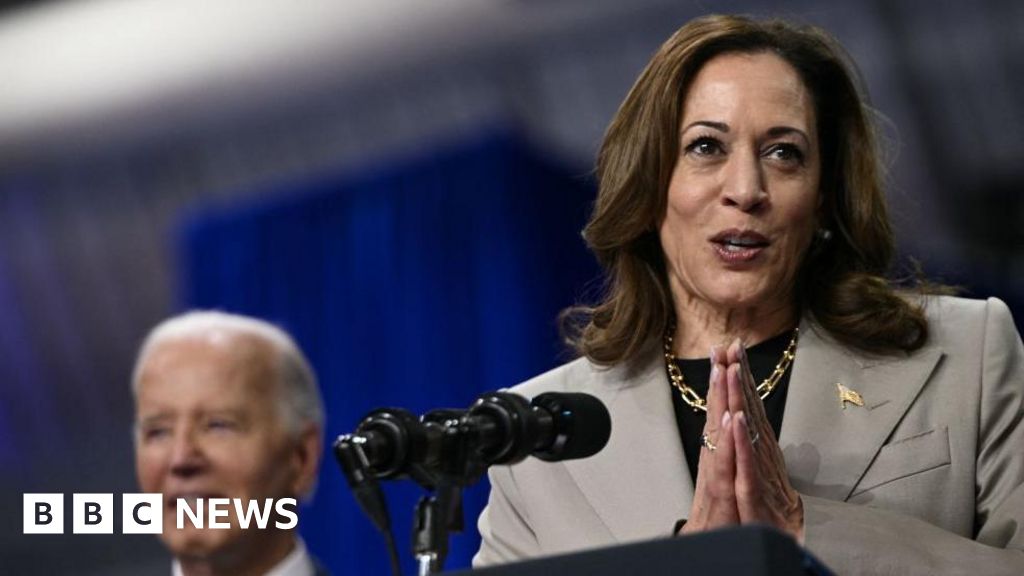In her first economic policy speech, Kamala Harris called for the construction of millions of new homes, assistance for first-time buyers, tax relief for families and a ban on “price gouging” in the food retail sector.
The Democratic presidential candidate’s plans build on ideas from the Biden administration and aim to address voters’ concerns about rising prices since 2021.
Many of the proposals would require action by Congress, where similar ideas have stalled in the past.
Donald Trump said the vice president had already had more than three years to put into action her promises, which his campaign team described as “dangerously liberal”.
“Where was she and why didn’t she do it?” he asked.
Ms Harris hit back in a speech in North Carolina on Friday, saying: “I think if you want to know who someone cares about, look at who they’re fighting for.”
“Donald Trump fights for billionaires and big corporations. I will fight to give working and middle-class Americans their money back.”
The campaign’s proposals include a “first-time homebuyer” tax credit for developers selling homes to first-time buyers and a down payment of up to $25,000 for “eligible” first-time buyers – a measure that her campaign estimates could reach four million households within four years.
She also called for capping the monthly price of the diabetes drug insulin at $35 for everyone, finding ways to cancel medical debt and giving families a $6,000 tax credit in the year a child is born.
She supports a federal law that prohibits companies from charging excessive prices for groceries and pushed for Congress to pass a bill that would prohibit property owners from using services that “coordinate” rents.
Democrats and their allies hope that Ms Harris will prove to be a more forceful and trustworthy ambassador on the economic issues than President Joe Biden.
Robert Weissman, co-chair of the consumer advocacy group Public Citizen, called Ms Harris’ plans a “pro-consumer, anti-corporate abuse agenda.”
“The (Biden) administration has talked about it, but it has not pushed the proposed measures nearly as aggressively as Harris is,” he said.
But pollster Micah Roberts, a partner at Public Opinion Strategies, said inflation is likely to remain a challenge for Democrats, noting that voters have long trusted Trump – and Republicans – more on economic issues.
“Trump has been ahead on this issue for over a year,” said Roberts, the Republican part of a bipartisan team that recently conducted a survey on economic issues for CNBC, which found Trump still has a big lead over Harris on this issue.
Without a huge change, it’s “hard to believe” that the margin has suddenly narrowed, he said.
Although analysts expect some of Harris’ proposals, such as banning price gouging, to be widely welcomed, they have also drawn criticism from some economists.
Price gouging is already banned in many states and applies during emergencies such as hurricanes.
But economists say the term is difficult to define, and expanding such regulations could backfire by discouraging companies from producing more during times of tight supply.
Michael Salinger, a professor of markets, public policy and law at Boston University’s Questrom School of Business, said a similar ban was discussed when he served as chief economist at the Federal Trade Commission during George W. Bush’s administration.
“I thought it was a bad idea then, and I still think it’s a bad idea today,” he said. “Controls in competitive markets lead to bottlenecks – that’s always been our experience.”
He said the Harris campaign’s other plans were also being questioned given their cost.
For example, the proposal to increase the child tax credit to up to $3,600, which Congress did temporarily during the pandemic and then decided not to extend, would cost more than a trillion dollars, according to some estimates.
Given the rise of populism in both parties, these costs have not stopped Trump’s vice presidential nominee, JD Vance, from supporting an even greater expansion of tax credits.
Professor Salinger said Trump’s other economic plans were unlikely to address inflation concerns.
Given the global nature of energy markets, economists believe that an expansion in drilling would have only a limited impact, and warn that Trump’s announcement to impose tariffs of 10 percent or more on imports would lead to a rise in prices.
Currently, price increases are easing as the shocks from pandemic-era supply chain problems and the war in Ukraine subside.
Inflation, which measures the pace of price increases, was 2.9% in July, the smallest annual increase since March 2021, the Labor Department said this week.
This is approaching the 2% pace considered normal, although prices have risen by about 20% since January 2021.
“People complain that prices are higher even when inflation is low. That’s true, but they are higher because of the natural effects of market forces,” Salinger said.
“Trying to stand in the way of market forces is like trying to stem the tide,” he added. “It just doesn’t work.”

